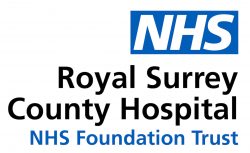 Abraham Lincoln
If given the truth, the people can be depended upon to meet any national crisis...
Abraham Lincoln
If given the truth, the people can be depended upon to meet any national crisis...
 Guildford news...
for Guildford people, brought to you by Guildford reporters - Guildford's own news service
Guildford news...
for Guildford people, brought to you by Guildford reporters - Guildford's own news service
Exercise May Aid Body’s Immune Response Against Cancer, Pilot Study Finds
Published on: 11 Jun, 2025
Updated on: 15 Jun, 2025
 Exercising during chemotherapy and before surgery may help the body send more immune cells into cancerous tumours, according to a ground-breaking pilot study carried out by the Royal Surrey NHS Foundation Trust and the University of Surrey.
Exercising during chemotherapy and before surgery may help the body send more immune cells into cancerous tumours, according to a ground-breaking pilot study carried out by the Royal Surrey NHS Foundation Trust and the University of Surrey.
A co-author involved in the study said: “We found that the fitter a person became, the stronger their immune response inside the tumour.”
Researchers are now looking to invite more patients to take part in a larger clinical trial called OPTIMUS, led by Consultant General Surgeon Professor Adam Frampton. The aim will be to understand how these early results could help improve cancer treatment on a wider scale.
In a study published in the Journal of Sport and Health Sciences, the research team conducted a randomised controlled trial with 22 people diagnosed with oesophageal adenocarcinoma – a type of oesophageal cancer.
Eleven participants took part in a 16-week structured exercise programme known as “prehabilitation”, while the other eleven did not. The programme included two supervised exercise sessions per week during the chemotherapy period (for about eight weeks), followed by a second phase of exercise leading up to surgery.
After surgery, the research team analysed each patients’ tumour samples.
Dr Nicola Annels, co-author of the study from the University of Surrey, said: “To the best of our knowledge, we believe that our study is the first randomised controlled trial in humans to show that prehabilitation – structured exercise during chemotherapy – can change the tumour environment in a meaningful way. We found that tumours from people who exercised had more cancer-fighting immune cells, especially CD8+ T cells and natural killer cells, compared to those who didn’t.
 “These early results are promising, but we need to understand them better, and that’s why we’re encouraging more patients to take part in the ongoing clinical trial.”
“These early results are promising, but we need to understand them better, and that’s why we’re encouraging more patients to take part in the ongoing clinical trial.”
Dr David Bartlett, co-author of the study from the University of Surrey, said: “We found that the fitter a person became, the stronger their immune response inside the tumour. In fact, the more a patient improved their aerobic fitness, the more immune cells we found as well as signs of mature ‘tertiary lymphoid structures’, which are immune hubs linked to better responses. It’s hard not to be excited by these results, but we need to confirm them in a larger clinical trial.”
OPTIMUS aims to recruit 50 patients who are scheduled for surgery after chemotherapy for oesophageal adenocarcinoma.
Patients will be randomised into one of two groups: either an exercise group similar to the published study that improved the immune response to the tumour, or a higher intensity exercise group that may increase the immune response further.
People can join the study if they are being treated at the Royal Surrey Cancer Centre and should ask their oncology or surgical teams about the study.
Funding for the research was obtained from the World Cancer Research Fund (WCRF UK), as part of the World Cancer Research Fund International grant programme.

Click on cartoon for Dragon story: Public Asked for Views on SCC’s Proposal for Reduced Speed Limits


Recent Articles
- From East Clandon to Paris – Charity Cyclists Complete Epic 24-hour Challenge
- Updated: Local MPs Vote in Favour of Assisted Dying
- Guildford Plans Three-Day Celebration In a Festival of History And Culture
- Local Therapy Garden Supporting Mental Health Shortlisted for BBC Award
- Thousands of Year Six Pupils at Guildford Cathedral for a Special Send Off
- New Surrey Research to Find Solutions to Local Challenges
- Comment: What Are We To Make of the GBC Executive ‘Reshuffle’?
- Bensons for Beds Opens New Store on Guildford High Street
- ‘Politics Is Not Always a Kind Place’ Says Dismissed Lead Councillor
- Merger Between Reigate & Banstead and Crawley Councils Ruled Out


Search in Site
Media Gallery
Dragon Interview: Local Artist Leaves Her Mark At One of England’s Most Historic Buildings
January 21, 2023 / No Comment / Read MoreDragon Interview: Lib Dem Planning Chair: ‘Current Policy Doesn’t Work for Local People’
January 19, 2023 / No Comment / Read MoreA3 Tunnel in Guildford ‘Necessary’ for New Homes, Says Guildford’s MP
January 10, 2023 / No Comment / Read More‘Madness’ for London Road Scheme to Go Ahead Against ‘Huge Opposition’, Says SCC Leader
January 6, 2023 / No Comment / Read MoreCouncillor’s Son Starts Campaign for More Consultation on North Street Plan
December 30, 2022 / No Comment / Read MoreCounty Council Climbs Down Over London Road Works – Further ‘Engagement’ Period Announced
December 14, 2022 / No Comment / Read MoreDragon Interview: GBC Reaction to the Government’s Expected Decision to Relax Housing Targets
December 7, 2022 / No Comment / Read MoreHow Can Our Town Centre Businesses Recover? Watch the Shop Front Debate
May 18, 2020 / No Comment / Read More






Recent Comments